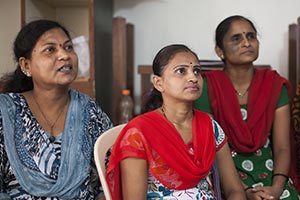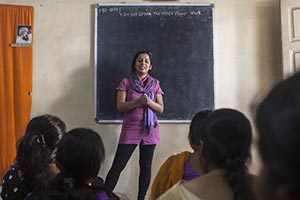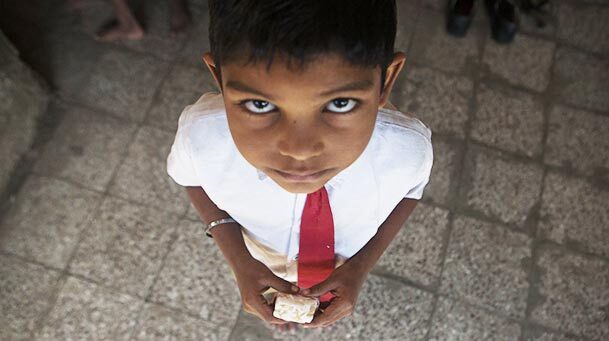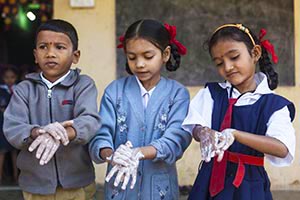New hope in old soap
As Erin Zaikis lay sick with dengue fever in a Thailand hospital in 2013, she had an epiphany. She wanted to dedicate her life to helping others.

After Zaikis discovered how many people live without soap, she created the soap-recycling nonprofit Sundara. (Photo: Bernat Parera)
Confined to her hospital bed with little to do, she ran through images of the rural Thai children she’d met while volunteering with the Jewish aid group Justifi.
One recurring detail stuck out from the rest: “They would use the bathroom and not wash their hands afterwards,” says the 2010 graduate of the Ford School of Public Policy. “I asked them what they would use [to wash] in the shower. They told me they just used just water, and talcum powder to absorb sweat.”
So one day Zaikis brought the children soap. “But they didn’t know what to do with it,” she says. “For many of these children, some as old as 13, it was the first time they had ever washed their hands with soap.
“I couldn’t believe it. I was 23 at the time and had lived my whole life without ever thinking about soap. Then I discovered that not everyone is lucky enough to take soap for granted.”
Approximately 3.5 million children die of diarrhea and respiratory diseases each year, according to the Centers of Disease Control. Hand washing is the best way to prevent these deaths.
Setting up shop
Once fully recovered from dengue and back in New York, Zaikis began to brainstorm ideas about producing soap and promoting hygiene.
She founded a soap-making operation named Sundara, a Sanskrit word for beautiful, and set about crafting her own soaps in her tiny New York kitchen. The goal was to raise money for schools like the one in Thailand.
However, her initial soap-making attempts produced disastrous results.
“The first soap burnt all my bowls and dishes,” Zaikis says. “I even set off the fire alarm by microwaving soap shavings until they smoked.”
Her parents, meanwhile, assumed she was “going through a phase,” using soap-making as a hobby to adjust to life back in New York. “They never realized I would actually make something of it,” Zaikis says.
Or to be more precise, that she would remake something of it.
Rinse and repeat
Ultimately Zaikis hit upon the concept of recycling hotel soaps, so often discarded after just a few uses. She just had to figure out how to collect the soaps, recycle them, and provide them to people in need.
She narrowed her focus to India, the site of her first internship while studying at Michigan. Inspired by a global poverty course, Zaikis had traveled to Mumbai in 2009 where she spent a summer working in a girls’ orphanage.
“It was intense,” she says. “I decided the next time I went back to India I had to go with a way to alleviate some of the suffering I’d seen.”
And with Sundara, she’d found that way. “Sanitation and hygiene issues in India are incredibly important, yet usually overlooked and underfunded,” Zaikis says.
She dived into the soap recycling project, but soon grew discouraged when she could locate only a few organizations that actually recycled soap. One was based in Hong Kong and the others were in the U.S. To avoid the high cost of shipping to India, Zaikis realized a local operation was the only way to go. And if one didn’t exist, she would have to create it.
Hope in a soap

Sundara employs local women in Mumbai to recycle soap and conduct local workshops in hygiene. (Photo: Bernat Parera)
In the spring of 2014, Zaikis won a LinkedIn for Good competition and grant, which allowed her to launch a soap-recycling operation in India. She wanted to partner with local nonprofits in Mumbai to lend her new organization some critical credibility.
“Hygiene education is a sensitive topic in any culture,” she says. “We can reduce that sensitivity when the lessons are coming from people that look like you and speak the same language, who have had similar life experiences.”
She turned to the U-M alumni network for help, and connected with Ross School graduates Sanjay Mirchandani, MBA ’89, CEO of construction and development company Mirchandani Group, and Bharat Govinda, MBA ’02, a senior insurance industry executive. Both responded immediately. They reviewed her business plans, offered suggestions, and opened the doors to hotels, nonprofits, and local women’s organizations.
“I know Michigan has the largest group of living alumni but it was only when I was half way across the world that I saw firsthand the helping power of that network,” Zaikis says.

Soap is peeled, sanitized, and recycled before being redistributed in the community. (Photo: Bernat Parera.)
Helping hands
As momentum picked up, Zaikis established the nonprofit arm of Sundara, partnering with local nonprofits Reap and Gabriel Project Mumbai. She connected with 10 boutique hotels and such major five-star resorts as the Taj Mahal, Four Seasons, Leela, and Mirador. Each week, the hotels provide more than 100 pounds of discarded soap for recycling.
Once the soaps are collected, Sundara’s staff uses vegetable peelers to remove outer layers from the bar. The remaining soap is soaked in a mix of bleach and water. The material is sanitized a second time with pressure and cut into new bars for distribution to local schools and slums in and around Mumbai.
All of this work is done by hand by local women who are paid three times the average wage. “For many of these women, it is the first job they’ve ever had. We are proud to be able to provide them with dignified employment – which unfortunately is a rarity for many of India’s poor,” Zaikis says.
Workshops and more

Sundara employs about 17 teachers who work at 30 schools in Mumbai and surrounding areas. (Photo: Bernat Parera.)
Sundara has produced and distributed more than 6,000 bars of recycled soap to date.
But as Zaikis learned in Thailand, simply providing soap to people who’ve never used it is not enough. So the organization also pays local women to conduct hygiene workshops to enforce healthy behaviors. The workshop leaders receive two weeks of training in hygiene, leadership, and public speaking before venturing out into the community. Sundara employs about 17 teachers who work at 30 schools in Mumbai and surrounding areas.
“The women talk about lice prevention and the importance of washing hands, and it has been a great confidence booster for them as well,” says Zaikis. “I’m so proud of these women for being a strong voice for self-care and empowerment. I am very inspired by them and think they’re the real heroes here.”
Zaikis is raising funds now to cover another two years of recycling and workshops and has expanded Sundara’s soap-making and recycling programs to Uganda.
Taking this leap was challenging for Zaikis, who is reserved and shy by nature.
“I have been amazed by all the help I have received,” she says. “The more you talk about your dreams, the better the chance is that you will meet someone who will resonate with them and want to assist you. Never underestimate the power of our alumni network. It really did help me make my dreams come true.”
For more information about Sundara, visit www.sundarafund.org.





Kathy Burton - 1972 and 1975
Your article was so inspiring and straightforward that I’m sending it on to our daughter. She may have some ideas about involving the restaurant industry in your endeavor.
Reply
Erin Zaikis - 2010
Thank you so much Kathy for your kind words. Please do have your daughter get in touch with me at thesundarafund@gmail.com and I’d love to connect with her about this.
Reply
Helen Epps - 1976 (Ph.D.)
It would be fascinating if some research could be done to see if disease rates are affected (improved) in the areas receiving the soap and the hygiene education.
Kudos to you.
Reply
Erin Zaikis - 2010
Thanks for the suggestion Helen! We plan to do a formal study at the end of the year or early next since it takes time to see such a difference. Thanks again for reading and for your support.
Reply
Joan Kripke - 1973, 1978, 1986
An amazing story. When in a hotel, I collect (daily) the soaps and bottles of shampoo,and all other personal items, such as shower caps, and give them to women’s shelters. Although not on the same scale as Erin’s project, it is something all of us can do to help others in need.
Reply
Erin Zaikis - 2010
Joan – a wonderful idea! Thanks so much for being aware of the problem and soap recycling on that level. It definitely makes a difference!
Reply
Susan Kery - 1980 and 1983
Dear Erin,
What an inspirational endeavor! You make all of us proud. I’ll donate to your cause, and request that other alums do so as well.
Reply
Erin Zaikis - 2010
Thank you so very much Susan! The link to donate can be found at http://www.gofundme.com/sundara and really, any donation will make such a difference with our efforts. Thank you again for considering us!
Reply
Leah Bitalac - 1989
Would you consider collaborating with us (a local organization) to promote your mission/vision in the Philippines? Thanks in advance.
Reply
Erin Zaikis - 2010
Certainly Leah! We are always looking to collaborate with more organizations and make a larger impact. Can you email me at ezaikis@gmail.com and we can discuss directly? Thank you so much.
Reply
Darlene Liston - 1975
I would like to start a movement to send unused miniature hotel soaps to Africa. Do you have any tips for me.
Reply
Erin Zaikis - 2010
Sure Darlene – can you please send me an email at ezaikis@gmail.com?
Reply
Raghu Mendu - 1981
Erin
What a wonderful thing you are doing? While I am based in he US I go to India 8 to 9 times a year. I know the UM alum are already helping and I would be thrilled to pitch in. You can find my details on our website http://www.ventureast.net do let me know how to reach you and if you are in India, I would love to meet and see how I can help.
Reply
Todd McKinney - 1993, 1995
Thanks, Erin, for your strong heart and willingness to be a force for good. Thanks, too, to Mandira Banerjee and Deborah Holdship for the story’s creation and delivery. A powerful piece, well-told.
Reply
Zafar Rathore - 2006
Erin, I appreciate your work and most innovative idea. I would love to practice the same at Pakistan.
Reply
Claire Hughes - 1983
Hats off to you, Erin! Many people have great ideas, but very few have the brilliance and perseverance to turn them into reality. Just shows how inspiration is 1 percent and hard work is 99 percent of success.
Reply
Sarah Orrick - 1985
Wow- What a great idea and execution. I will also share this article with my UM daughter!
Reply